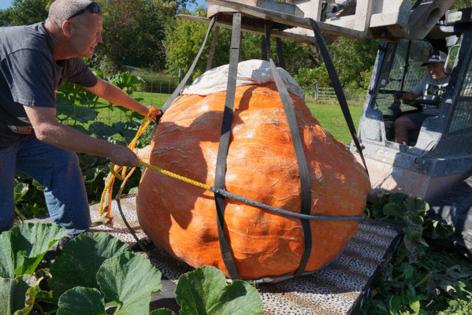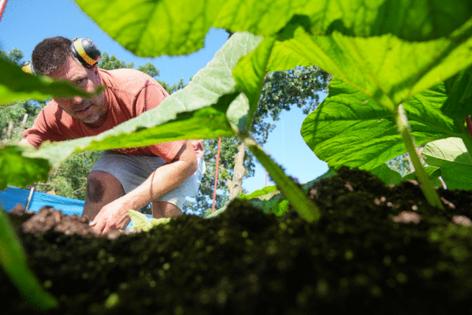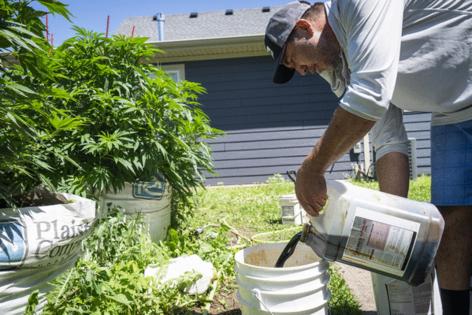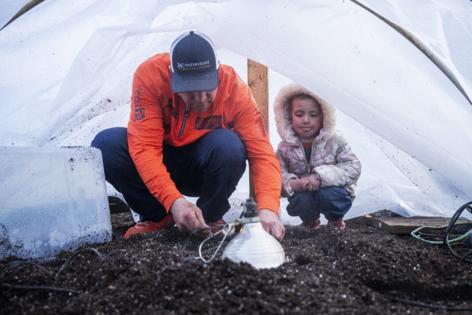Has the country's greatest giant-pumpkin grower reached the end of his vine?
Published in Lifestyles
ANOKA, Minn. -- On a chilly April morning, Travis Gienger took his first gamble of the 2025 season. The world-champion giant-pumpkin grower typically starts his seeds indoors. But this year he was out in his backyard, crawling in the dirt to sow them directly.
While some pumpkins as big as Mini Coopers are raised in climate-controlled, C02-boosted greenhouses, Gienger, who lives in Anoka, places his trust in Minnesota’s unpredictable weather — a handicap he’s likened to “winning the Tour de France on a Big Wheel.”
The energetic grower, who moves in a constant state of hustle, had dug several feet into his plot, layered in potting soil, “a bunch of different biologicals” and more than 500 feet of roof de-icing cables. He’d strategically selected four giant-pumpkin seeds and entrusted his daughter Lily with the responsibility of pressing one into the ground. “Three-year-old planting a $300 seed,” he joked.
Giant pumpkins, which can pack on 50 pounds a day, are a different species than the ones carved for Halloween. And competitive growers — who speculate on seed lineages like stock brokers, and jury-rig systems to heat, cool, water and dry out their plants — are an entirely different breed of gardener.
Among the greatest is Gienger, four-time winner of the Safeway World Championship Pumpkin Weigh-Off, the hobby’s Super Bowl. Gienger has earned tens of thousands of dollars from the national contest, which takes place each October in Half Moon Bay, Calif. At 2023’s weigh-off, Gienger squashed the previous world record with a 2,749 pound behemoth.
But this year’s planting was off to a less-than-auspicious start. Gienger had inadvertently overwatered Lily’s seed. In the process of adding more dry soil, the coin-sized kernel had seemingly vanished. The anxious father scooped dirt through his hands, concerned his shot at a fifth national title had landed outside of the area he’d carefully warmed to 90 degrees.
“We gotta find the seed, Lily,” he said. “Where’d it go?”
Exponential growth
Gienger won his first pumpkin-growing competition as a teenager at the Minnesota State Fair, but his victory was marred by an enormous loss. When Gienger’s family visited the fairgrounds, his grandmother had a heart attack in the Colosseum and died before she got to see his blue ribbon winner.
Three decades later, Gienger splits his time between his hardscaping business specializing in stone fire and water features, teaching horticulture at Anoka Technical College and optimizing his giant pumpkins’ growth.
World-record pumpkins have been growing categorically. The first one to exceed 1,000 pounds was grown in the mid-1990s; the 2,000-pound mark was crossed in 2012. Now, 3,000 pounders don’t seem out of reach.
Gargantuan pumpkins are the product of genetics, soil and growing techniques, explains Chris Brown, a giant-produce grower in Zimmerman, Minn., who emcees local pumpkin weigh-offs. Brown, who has known Gienger since they were in a high school horticulture class together in Anoka (the self-proclaimed Halloween capital of the world), attributes giant pumpkins’ steep growth trajectory to their producers sharing knowledge and seeds. (Selective breeding is the secret, not genetic engineering.)
The communal approach, and the understanding that any grower can have a record-setting season, creates a camaraderie he and Gienger relish. “That’s why all of us encourage each other, because we’ve all been through the bad years and we’re excited about the good years,” Brown said.
A lot of plus-size pumpkins are grown in the Upper Midwest, but also in Northern California, Oregon and Europe. Seeds are named for their parent-pumpkin’s weight ( 2560 Maverick, for example) and those with desirable lineage have sold for more than $1,000. But Gienger says money can’t buy a win.
“I put a lot of importance to my seed, but I’ve also always said, ‘It ain’t the seed, it’s how we grow.’ ”
Gourd big or go home
Growing giant pumpkins begins with growing giant vines, which, by midseason, sprawl across hundreds of square feet. Growers often hand-pollinate just one blossom per vine. The trick is to grow a big vine that will carry a lot of “fuel” to the pumpkin, without using too much energy that could be bulking up its fruit.
The secret to getting a plant “cranking,” Gienger says, is in his garden shed full of fertilizers, microbes and fungi, from alfalfa meal and crab and lobster shell, to bacillus, mycorrhiza and trichoderma. “I’ve got sponsors sending me tens of thousands of dollars in biology,” he said. “By no means do you have to spend 50 grand to grow a pumpkin — that’s insane — but if they’re gonna give it to me, I might as well use it.”
Then there’s growing technique. Gienger spends countless hours burying vines so they’ll re-root and bring up more nutrients. This year, he tried staking leaves for optimal sun-catching. He’s experimented with overhead watering and drip-irrigation systems as well as fabric shades and fans.
Though Brown describes Gienger as “a normal grower just like everybody else,” he points out three differentiating features. First, Gienger’s ability to put in the necessary time and physical labor (he works at home and can garden between machine-enabled stone-cutting). Second, he grows only a couple of giant pumpkins each year so he can really focus. And third, all the free growth-enhancing products from sponsors.
By early June, Gienger had grown one shot at another national title: a beanbag-sized pumpkin he’d dubbed “Happy.” Only one of the four seeds he’d originally planted took, and he wasn’t sure if it was Lily’s. The whitish gourd was growing slower than he liked (he estimates weight based on circumference), but his pumpkins tended to pack on the pounds during August and September. It was too early to tell if he had a contender.
Four times in the past five years, Gienger loaded a pumpkin of unknown weight onto a trailer and driven it 2,000 miles to California. (“We probably could weigh it before, but it just wrecks all the fun.”) All four times he’d won. Last year by a mere 6 pounds.
Perils of picking
Late September: the moment of truth. Gienger sat in his forklift and slowly lifted a pumpkin of nearly the same size, cradled in thick straps. If the bottom was decayed, or critter-bitten, or if Gienger dropped it and cracked it, it could be ineligible for competition.
Gienger’s neighbor David Jabe, kneeling beside the pumpkin, peeked underneath the precarious load. “Looks pretty good,” he said. Jabe guided the behemoth over a wooden pallet and Gienger gently released it. After breathing sighs of relief, the two engaged in an odd-looking ritual: slapping the pumpkin, from shoulders to rump, to assess its density.
But this was not the pumpkin Gienger had been waiting all season to lift. The presumed GOAT of America’s giant-gourd growers hadn’t cemented his title.
This pumpkin was Jabe’s, a 1,900-some pounder he’d grown with Gienger’s mentoring that would go on to win the nearby Nowthen Heritage Festival’s weigh-off.
Gienger’s chance to go to nationals had decayed a few weeks earlier, when Happy succumbed to rot. His herculean effort had been wiped out by a pinhole that Gienger could barely see, much less control.
Gienger noted that the year interrupting his winning streak, 2021, was when Lily was born. His best pumpkin split. This year, her sister Grace had arrived. Between having a healthy pumpkin or a healthy kid, Gienger’s priorities were clear. “Guess it’s just God’s way of saying you get to raise a lifelong pumpkin,” he posted on social media.
Even before he and his wife had their second child, Gienger had been mulling retirement. His stonework was taking off and he wanted to spend more time with his family. “With the kids and business is it really worth my time to try for 2,000-pounders?” he mused. “The thing is, if you’re not doing it like you should, someone else is doing like they should. So you can only go so long before you get knocked off.”
But if Gienger cared much about getting bumped off his giant orange pedestal, he wouldn’t have spent years freely sharing his growing tips, or his seeds. His motivation was less about personal glory (his world record was just beaten by twin brothers in England) than aweing others with his fantastical creations, of conjuring Cinderella’s carriage to life.
‘Meant to grow’
Gienger brought a (relatively) paltry 600-pound, vibrant-orange pumpkin he’d planted after the first batch to the Nowthen festival, where it was judged “best-looking.” Lily, wearing a jack-o’-lantern shirt, was ecstatic, smiling for the camera as she clutched the trophy. “You woulda swore she won the world record,” Gienger said. “It wasn’t the pumpkin I set out to grow, but it was the pumpkin I was meant to grow.”
For Gienger, the season has been bittersweet. At the California competition, a pumpkin grown with one of his seeds took first place. He couldn’t help but wish the 2,346-pounder had been his, but it felt good to see someone else succeed with his genetic material.
It was too early for Gienger to say if he’d do another serious planting next spring, or if this was the end of the vine for his competitive growing.
As Gienger compared cultivating giant pumpkins to fishing — “you’re casting your bobber out there, and who knows” — he flashed his signature jack-o’-lantern grin. The prospect of another big one still held a thrill.
©2025 The Minnesota Star Tribune. Visit at startribune.com. Distributed by Tribune Content Agency, LLC.

































Comments